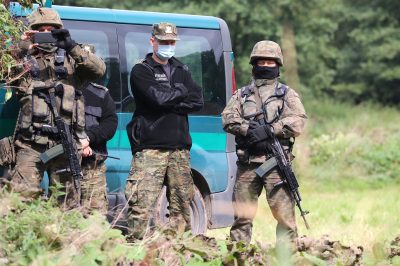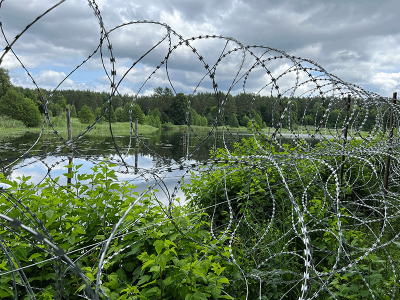
On 17 September 2023, the commander of the Border Guard post in Gdańsk issued a residence permit on humanitarian grounds to protect the private life of our client, known as Xenia Uranova.
Proceedings in the case of Xenia Uranova
Xenia comes from the Russian Federation and is an artist and musician. She first travelled to Poland in 2005 to take part in an international historical and cultural project. In 2018, She moved to Poland permanently, mainly for political and personal reasons. In the same year, she received a temporary residence permit in Poland and applied for a further permit during the period of validity. Her application was not considered. For this reason, return proceedings were initiated against Xenia, which were finally concluded in 2021 with a final decision.
Xenia asked the Ombudsman to file a request to initiate the procedure for granting a residence permit on humanitarian grounds, which would allow her to stay on the territory of the Republic of Poland. After examining her case, the Ombudsman came to the conclusion that the competent authority must re-examine whether there are grounds to grant her humanitarian residence on the territory of the Republic of Poland due to the new circumstances that came to light after the adoption of the final decision to oblige Xenia to return. This statement by the Ombudsman obliged the Border Guard to initiate the procedure.
The evidence presented shows that Xenia was and is actively involved in actions against the war in Ukraine caused by the Russian invasion, including the purchase of a drone for the Ukrainian army, cooperation within the “Food Not Bombs" initiative, participation in the protest of women in front of the Consulate General of the Russian Federation in Gdańsk, etc.
In addition, during the proceedings it was proven that Xenia not only supported the Ukrainian side in the military conflict, but also led her private and professional life in Poland, which was an important reason for granting her a humanitarian residence permit. The Border Guard referred to the case law of the European Court of Human Rights (ECtHR), which interprets “private life” in a broad sense, including as the possibility for a person to develop their social identity, which involves establishing and developing relationships with other people.
In its decision, the Border Guard rightly noted that the case law of the ECtHR states that professional and business activities are part of private life. In Niemitz v. Germany, the Court found that most people establish their contacts mainly in their professional lives. In other cases, the Court has ruled that interference with professional life may constitute a violation of Article 8 of the European Convention on Human Rights (the right to respect for private and family life) if it affects the way in which a person builds their social identity by developing relationships with people who are similar to them. As most people have the opportunity to strengthen their relationships with the outside world through their work, professional life is very often intertwined with private life, so it is not always possible to distinguish the way in which a person is acting at any given time. The court emphasised that most people have significant, if not the greatest, opportunities to develop relationships with the outside world during their working years. Professional life is therefore part of that sphere of interaction between an individual and other persons which — even in a public context — can be regarded as an element of “private life”.
The Border Guard also rightly concluded that in Xeni's case it is difficult to clearly separate the spheres of artistic activity and private life, as these areas are somehow intertwined. Xenia defines herself as an artist and most of the relationships she enters into with other people have to do with her artistic work.
Another argument in favour of granting a residence permit on humanitarian grounds was the relationship between the Republic of Poland and the Russian Federation, which was cited by the authority that issued the decision. Currently, citizens of the Russian Federation can only obtain a visa if they are spouses or minor children of EU citizens, holders of a Card of a Pole, their spouses and minor children, and for humanitarian grounds. For this reason, even if the ban on entering the territory of the Republic of Poland and other Schengen countries imposed in the compulsory return decision is not indefinite, after its expiry it would be very difficult or practically impossible for Xenia to re-enter Poland.
Xenia was represented by an HFHR lawyer, Ekaterina Hil. To read the decision, use the link below.
What is a humanitarian residence permit?
A humanitarian residence permit or “residence permit on humanitarian grounds” is a national form of protection for migrants or stateless persons who are subject to a return procedure if return is not possible for important reasons.
The humanitarian residence permit is regulated in Section VIII, Chapter 3 of the Foreigners Act of 12 December 2013. The Border Guard is the authority that issues decisions in such procedures, with the Commander-in-Chief of the Border Guard being the superior authority (since April 2023, previously it was the Head of the Office for Foreigners).
A residence permit on humanitarian grounds is granted for an indefinite period and the recipient of the permit is issued with a residence card, which must be renewed within the specified time limits (every 2 years). In some cases, however, this permit may be withdrawn or expire.
According to the Foreigners Act, a residence permit is granted on humanitarian grounds to a person who is subject to a return obligation if their return
- may only be made to a country in which their right to life, liberty and personal security would be threatened or they could be subjected to torture or inhuman or degrading treatment or punishment or they could be forced to work or deprived of the right to a fair trial or punished without a legal basis,
- would lead to a violation of the right to family or private life,
- would lead to a violation of the rights of the child to an extent that would significantly jeopardise their psycho-physical development.
According to the judgment of the Supreme Administrative Court of 13 March 2018 (II OSK 1969/17), the authority that obliges the foreigner to return to their country of origin is obliged to check in each case whether the conditions for granting a residence permit on humanitarian grounds or a tolerated residence permit are met. The case law of the administrative courts also frequently emphasises that the situation in the foreigner's country of origin must be considered in close connection with the foreigner concerned[1].
The grounds for granting a humanitarian residence permit under Article 348 of the Foreigners Act overlap to a considerable extent with those for granting refugee status and subsidiary protection. With regard to the risk of torture or inhuman or degrading treatment or punishment, the grounds laid down in Article 15 (2) of the Act of 13 June 2003 on the granting of protection to foreigners on the territory of the Republic of Poland and Article 348 (1) (b) of the Foreigners Act are actually duplicated[2]. An important difference is the second ground for granting a humanitarian residence permit, which is based on the right to protection of family or private life and does not appear as a ground for granting international protection.
This condition was also important for other decisions on the granting of a humanitarian residence permit issued in proceedings of clients represented by HFHR lawyers. On 1 December 2021, the head of the Office for Foreigners in Warsaw decided to grant such a permit to M. and her five children, who are citizens of the Russian Federation, invoking the right to protection of family and private life and the protection of children’s rights. The authority was of the opinion that since the family had been living in Poland for more than 4 years at the time of issuing the compulsory return decision, the children's rights to proper development could be jeopardised if they had to return to their country of origin. As the head of the Office for Foreigners explained, leaving Poland would mean breaking ties with the environment and losing the sense of security that plays a very important role in the psycho-physical development of children. It was also very important that the school assessment reports showed that M.’s children were very well integrated into the school environment and that Poland was a country with which they identified. M. and her adult son were also granted a humanitarian residence permit, as the compulsory return of the mother and brother would lead to the separation of the family. It is important to note that the authority attached less importance to the fact that the family was in Poland without a valid visa prior to the compulsory return decision. In the opinion of the head of the Office for Foreigners, the effects of the forced return were disproportionate to the degree to which the family had violated the law. The M. family was represented by HFHR lawyer Ewa Ostaszewska-Żuk.
In a further decision, dated 17 November 2022, the head of the Office for Foreigners granted A. and her underage son a humanitarian residence permit on the grounds that the forced return of the child would endanger his psychophysical development. In the decision, the authority noted that the child's educational process was disrupted and hindered by the lack of a sense of security, including uncertainty about his future stay in Poland. At the time of the decision, the family had already been in Poland for 6 years and the boy was being looked after by a child psychology clinic. The head of the Office for Foreigners was of the opinion that a return to the country of origin would violate the rights of the child within the meaning of the Convention on the Rights of the Child and that the forced return of the mother would violate the right to family life.
All the decisions can be viewed below.
[1] M. Kumela-Romańska, Problemy Współczesnego Prawa Międzynarodowego, Europejskiego i Porównawczego, vol. XIV, 2016, p. 155, accessed on 28.09.2023: https://europeistyka.uj.edu.pl/documents/3458728/134551836/149-162_M.Kumela-Roman%CC%81ska.
[2] M. Kowalski, 2 Formy ochrony cudzoziemców i ich stosowanie wobec obywateli Ukrainy w polskiej praktyce [in:] D. Pudzianowska (Ed.), Status cudzoziemca w Polsce wobec współczesnych wyzwań międzynarodowych, Warszawa 2016.


